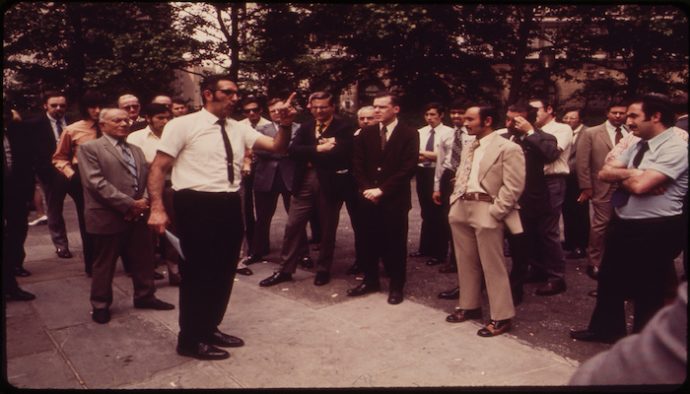You can almost hear the voice of the revival preacher bouncing off the tent folds somewhere in the deep south as he describes the perils of hell and the fact that we’re all headed there. Over and over again comes the question, “Have you been sa-a-a-a-aved-d-d-d-d-d!?!?!?!”
That word, maybe more than any other, has become part of the regular vernacular of Christian churches. We have used it so often that we don’t even think about it any more. We say that “we got saved” at this particular moment or that particular event. We ask others if they’ve been saved. So ingrained is this particular word in the vocabulary of the Christian sub-culture that it became the one word name of the 2004 satirical film mocking it.
There has been, I think, in the last several years, an implicit effort to “update” some of the language of the church. That’s all well and good, I suppose, but the danger in updating language like this is that you start to lose the sense of what words like these are meant to communicate. So at least in this case, I think there are two compelling reasons why we, as Christians, should keep using the word “saved”:
1. It puts us in our place.
Inside the church, we talk a lot about being saved, but outside the church, people are asking a very valid question: “From what?” The word itself implies danger. Trouble. Hardship. Something that needs to be escaped from. You would have a hard time selling that to the vast majority of the people outside the church, because their lives don’t feel dangerous. They don’t feel particularly perilous. They certainly don’t see much of anything they need to escape from. Truth be told, the word that describes their lives best is something like, “Comfortable.” So being “saved” isn’t something that resonates with them, for they simply don’t see anything they would need to be saved from.
But isn’t that really the worst kind of danger? It’s one matter to be walking through the African savannah and see a lion up ahead. A lion certainly isn’t an animal you want to walk up on; so you stop, you calm yourself, and you start to slowly back away. You sense the danger of the situation, and so you know you need to get out of it as quickly as possible.
But what if you weren’t in the African savannah; what if you were in the South American rain forest. And you were trudging your way through the thick underbrush. So thick were the roots, vines, and foliage that you never saw the venomous snake coiled on the ground. Your boot came down closer and closer and closer and then . . .
You never saw it coming. Clearly that’s a worse sort of danger than the kind you are aware of. But there’s another difference in those two dangerous situations. In the first, due to your awareness, you can play a part in your salvation. You can slowly back away. You can turn and run. But in the second scenario, you truly need to be saved. You need an external force to act upon you in order for you to be delivered.
This is how the Bible describes all of humanity in Ephesians chapter 2:1-3:
“And you were dead in your trespasses and sins in which you previously walked according to this worldly age, according to the ruler of the atmospheric domain, the spirit now working in the disobedient. We too all previously lived among them in our fleshly desires, carrying out the inclinations of our flesh and thoughts, and by nature we were children under wrath, as the others were also.”
It’s a pretty dire situation. Notice the specific word the Bible used to describe the human condition: Dead. If that word doesn’t speak to the severity and desperation of our situation, then surely nothing does. In fact, this word moves our situation well past desperate and into the territory of hopeless. When we use the word “saved”, and when we mean and understand why, we are reminding ourselves of this reality. That apart from God’s intervening grace, we are powerless to alter our own situation. We need to be saved, because in our condition, there is no other option for us.
2. It puts God in His place.
We often think being saved is something like this: We are floating in the sea of sin and death about to drown when, with our last bit of strength, we cry out to Jesus who throws us a life preserver. That’s certainly a situation from which we would need to be saved, but that’s not what we see in this passage of Scripture. Instead, the picture here is of a corpse, dead and bloated, floating face down in the sea. No strength. No power. No hope.
That’s what it means to be saved.
And that’s the promised of the gospel. Ephesians 2 continues with two of the most amazing words in all of Scripture: “But God . . .” We were dead, but God . . .We had no hope, but God . . . We could not rescue ourselves, but God . . .
The gospel doesn’t claim to help the weak; it claims to make the dead live again. It is only when we begin to see the true nature of the utter despair of humanity that we begin to see Jesus not as the key to a better life. Not as a sage only teaching about love. Not as a miracle worker only concerned with the alleviation of human suffering.
Jesus is our Rescuer. And, according to the Bible, He rescues from sin and death. In the ultimate “But God” moment, Jesus reaches down and hauls the corpse of humanity up and breathes new life into it. In so doing, He saves us from sin and its corresponding just punishment: death.
Jesus, the Great Rescuer, has come, and His salvation is the move from spiritual death to spiritual life forever with Him. Let’s say it, remember it, and attribute the credit and honor where it’s due. To God alone be the glory, for He has done for us what we could never do for ourselves. In His great love and mercy, He has saved us.
Subscribe to MichaelKelley.co
Never miss a new post. Subscribe to receive these posts in your inbox and to receive information about new discipleship resources.





1 Comment